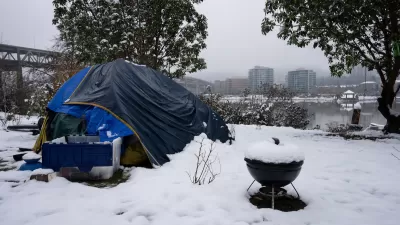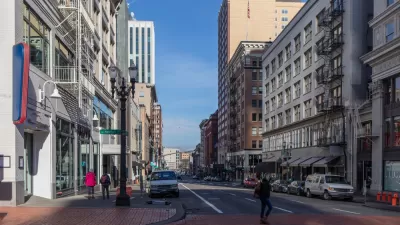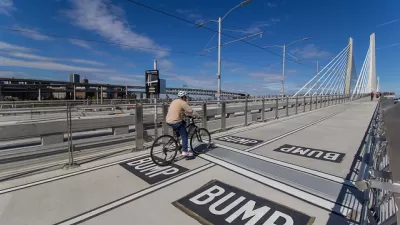Car registration statistics from Multnomah County show passenger vehicle ownership is less popular among its growing number of residents. The residents forgoing cars have done themselves a favor in more ways than one.

Michael Anderson has written a pair of posts to calculate the effect of reduced car ownership in Portland, Oregon. According to the premise of both articles, about 38,501 additional cars would be on the road in Portland if residents owned cars at the same rate as in 2007.
The first post, published in June, calculated and visualized the amount of space the reduced car ownership gains the city. For that record, "that’s everything between NE Killingsworth, Skidmore, Rodney and 16th," or "it’s the entire Foster-Powell neighborhood west of SE 73rd Avenue," among other large swaths of the city.
Andersen's newest post focuses on "the money that isn’t being spent to move, maintain, insure and replace all those cars." For each of the 38,501 cars, Andersen calculates a savings in insurance, purchase, and taxes and fees to produce a "very low estimate of direct car ownership costs per year" totaling $2,178. "So just by not owning 38,501 cars that they would have owned in 2007, Multnomah County residents are saving $83,855,178 each year to spend on other things instead," concludes Andersen.
Andersen the imagines a wish list of big ticket items that could be paid for with the money saved on reduced car-related spending, including eliminating tuition at Portland Community College, building out the entire bike plan for the city, or nearly eliminating fares on the TriMet transit system.
FULL STORY: Portland’s drop in car use frees up $138 million in our local economy every year

Alabama: Trump Terminates Settlements for Black Communities Harmed By Raw Sewage
Trump deemed the landmark civil rights agreement “illegal DEI and environmental justice policy.”

Study: Maui’s Plan to Convert Vacation Rentals to Long-Term Housing Could Cause Nearly $1 Billion Economic Loss
The plan would reduce visitor accommodation by 25% resulting in 1,900 jobs lost.

Planetizen Federal Action Tracker
A weekly monitor of how Trump’s orders and actions are impacting planners and planning in America.

Waymo Gets Permission to Map SF’s Market Street
If allowed to operate on the traffic-restricted street, Waymo’s autonomous taxis would have a leg up over ride-hailing competitors — and counter the city’s efforts to grow bike and pedestrian on the thoroughfare.

Parklet Symposium Highlights the Success of Shared Spaces
Parklets got a boost during the Covid-19 pandemic, when the concept was translated to outdoor dining programs that offered restaurants a lifeline during the shutdown.

Federal Homelessness Agency Places Entire Staff on Leave
The U.S. Interagency Council on Homelessness is the only federal agency dedicated to preventing and ending homelessness.
Urban Design for Planners 1: Software Tools
This six-course series explores essential urban design concepts using open source software and equips planners with the tools they need to participate fully in the urban design process.
Planning for Universal Design
Learn the tools for implementing Universal Design in planning regulations.
Caltrans
Smith Gee Studio
Institute for Housing and Urban Development Studies (IHS)
City of Grandview
Harvard GSD Executive Education
Toledo-Lucas County Plan Commissions
Salt Lake City
NYU Wagner Graduate School of Public Service





























